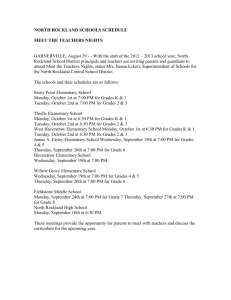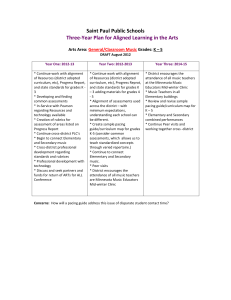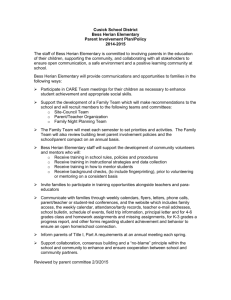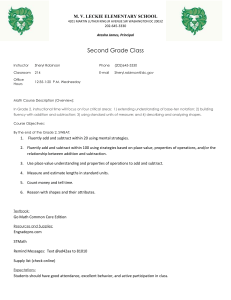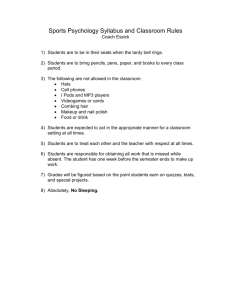C:\Documents and Settings\Rick\Desktop\Homework POLICY.wpd
advertisement
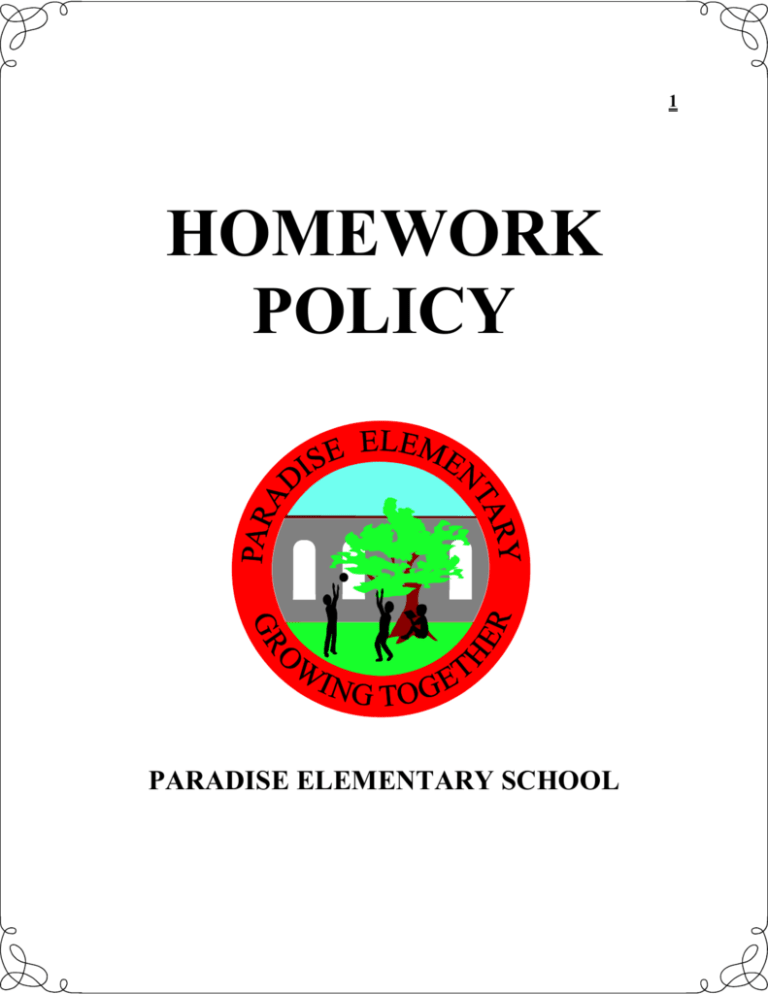
1 HOMEWORK POLICY PARADISE ELEMENTARY SCHOOL 2 Contents IntroductionPage 3 Statement of PurposePage 4 PhilosophyPage 5 Guidelines for Teachers Page 7 Guidelines for ParentsPage 10 Helpful Hints for ParentsPage 11 Helpful Hints for Primary ChildrenPage 13 Helpful Hints for Elementary ChildrenPage 14 How to Study/Review Page 15 3 Introduction As recommended in the report of the District Committee on Student Achievement (Conception Bay South Integrated School Board), a committee was formed at Paradise Elementary to develop a school homework policy. Membership on this committee consisted of two primary teachers, two elementary teachers and one parent representative. Because of the importance of parental involvement in homework, the input of parents on the development of this policy has been greatly appreciated. During the fall term (1994), the committee developed and administered two questionnaires about homework - one for all parents and one for all teachers. These questionnaires were intended to establish what teachers and parents were experiencing with homework and to assist the committee in establishing a policy and guidelines for its use. Most importantly the questionnaire provided all parents and teachers an opportunity for input into the formation of this policy. Jody Gill - Davis Jill Normore Frances Hawley Beverly Roberts (parent member) Claudia Long (chairperson) 4 Statement of Purpose The purposes of this policy are as follows: * to provide specific guidelines on homework for teachers, parents, and students * to help promote continuity and consistency with homework practices throughout the school * to help promote and foster positive attitudes/experiences about homework * to help new teachers/parents/students adjust to homework practices at this school * to help increase the level of communication between home and school, especially as it relates to home assignments 5 Philosophy In establishing a philosophy for homework, the committee primarily looked at its purpose. The committee has established that homework can be used for the following reasons: - to reinforce school activities - to extend/broaden school activities - to provide drill/practise for specific skills - to complete unfinished tasks - to provide parents with an opportunity to become involved in the child's learning - to promote/foster regular study habits in children As stated in the report of the District Committee on Student Achievement: "Homework provides students with opportunities to apply learning and experience necessary practice. It is also designed to develop a certain amount of independence among students and provide an opportunity for them to take personal responsibility for their own achievement" (p. 10) This being stated, however, Paradise School fully realizes that homework activities are but one source of learning experiences for the children outside of the school day. The extra-curricular involvement (both within and outside school) of students at Paradise Elementary is high. Each of these activities (eg. Brownies, Beavers, Cubs, swimming, music, gymnastics, etc.) provides children with educational experiences to enhance their growth and educational development. In addition, societal influences on children must be taken into consideration. Many children at the school are facing family situations dealing with unemployment, parental separation, joint custody, etc. Teachers and parents alike must be aware of the high levels of stress many children deal with on a daily basis. Homework tasks must be assigned with this in mind. 6 Finally teachers at Paradise Elementary also fully realize the uniqueness of each child in the school and his/her needs. Whereas the guidelines in this report are based on the "average" primary and elementary child, individual differences among children must be taken into consideration by parents and teachers. Exceptions to these guidelines, therefore, must be expected when dealing with children of special needs. The importance of clear and concise communication between home and school cannot be over-emphasized especially in these situations. 7 Guidelines for Teachers *Homework should be assigned with specific instructional purposes and related to the classroom activities, themes, objectives and outcomes. *All teachers of a particular class [ie., regular classroom teacher, special education teacher(s), challenging needs teacher(s), music teacher, physical education teacher, etc.] should be aware of the homework tasks assigned to students to ensure "overload" does not occur. *Homework tasks should be appropriate to students' levels of achievement and individual differences in ability must be considered. Expectations for homework tasks must then be adapted accordingly. *Teachers should be cognizant of factors such as extra curricular activities, home/family support, and children's interests in assigning tasks. *All tasks should be explained clearly, keeping in mind the varying ability levels of children within a class. Whenever applicable, concise written instructions would ensure parents have a clear understanding of the tasks involved. * It is recommended that homework agendas be used to record daily homework tasks. (This is especially helpful from grade one and beyond). Regular checks of these agendas is essential. Parental signatures/initials each evening is strongly recommended. * In addition to agendas, use of monthly calendars at all grade levels is recommended. Such calendars can keep an overall record of upcomingassignment due-dates, important events, physical education classes, music classes, etc. They can also keep parents informed of main themes/topics/objectives that children will be involved with. *New concepts should never be introduced as homework tasks. Exceptions to this could include work assigned due to absence from school (eg. illness, travel) or prereading activities assigned prior to new units being introduced in class. 8 * The following time frames are given as a guideline for assigning homework tasks: General Time Allotments Per School Night Grades K-120 minutes maximum Grades 2-330 minutes maximum Grades 440 minutes maximum Grades 550 minutes maximum Grades 660 minutes maximum N.B. These allotments are based on school nights (i.e. Monday to Thursday) * Teachers should be flexible in these assignments. Children should not be required to complete the maximum amount of time each school night. *Most homework should be assigned Monday to Thursday with limited amounts assigned specifically for the week-end. When a test/task is assigned for a Monday at least three school nights notice (when necessary) should be given. * At the elementary level children should be given reasonable notice for the study of chapter tests/quizzes - at least 2-3 school nights is recommended. It is also recommended that students be given study guides for such tests outlining (i) important concepts to review, (ii) important vocabulary, (iii) important pages, worksheets etc. to review. This is especially important in light of our approach to resource - based teaching where the concepts covered or emphasized may not correlate directly with the concepts covered in a textbook chapter. * A clear statement of expectations for homework at each grade level should be included in the parent packages given at Parent Orientations. Such expectations could include, for example: - the correcting of errors in homework tasks - expectations for neatness - the use of manuscript vs. cursive writing * When homework assignments are consistently not being completed, parental 9 contact is essential (phone calls, notes in agendas, etc). An appropriate plan of action should be developed between the student, parent, and teacher. This plan should be appropriate to the child’s needs and home influences. Teachers can avoid increasing the stress load of students in this situation by: - Praising all efforts of the student. (The completion of a portion of an assignment should be recognized.) - Talk with and listen to the child. There may be legitimate reasons why the tasks haven't been completed. - Avoid overload by not assigning more than one night's tasks to be completed in one night. Be flexible. - Refrain from depriving children of any part of a recess period. (Reference: The Schools Act, 1970, Section 81) * Time should be made each day for students to record homework tasks and prepare materials for homework assignments. When two or more teachers are involved, consistent routines for recording homework are essential. Students need to be aware of the expectations of all teachers involved. 10 Guidelines for Parents *The following guidelines for teachers have been established as general time allotments per school night for homework tasks. General Time Allotments Per School Night Grades K-120 minutes maximum Grades 2-330 minutes maximum Grades 440 minutes maximum Grades 550 minutes maximum Grades 660 minutes maximum N.B. These allotments are based on school nights (i.e. Monday to Thursday) *Most homework should be assigned Monday to Thursday with limited amounts assigned specifically for the week-end. When a test/task is assigned for a Monday at least three school nights notice (when necessary) should be given. *At the elementary level children should be given reasonable notice for the study of chapter tests/quizzes at least 2-3 school nights is recommended. *Homework is assigned to children based on specific instructional purposes related to classroom activities/themes/objectives. Homework tasks should be appropriate to your child's level of achievement. Exceptions to these guidelines are to be expected when dealing with children having special needs. 11 Helpful Hints for Parents * Check your child's bookbag, planner/homework notebook, homework "bag" etc, each evening to ensure you see what your child's tasks are and when they are due. * Initialling or signing the agenda nightly helps teachers to see if homework has been checked. Agendas also provide an effective way to communicate short messages/questions to (and from) the teacher. * Keep a ready supply of homework materials on hand for your child to use. A plastic container or box holding pencils, sharpeners, crayons, leads, glue, a dictionary, tape, etc. is necessary. * Try to encourage a regular homework routine. Set a time suitable to both you and your child for the completion of homework tasks. Structure the study time so that she/he knows how much study time you expect. Help older children to develop a regular study schedule. * Choose a quiet, well - lit place for your child to work. To help foster concentration, avoid working near the television, telephone, stereo, etc. * Don't take over your child's tasks. Oversee assignments, ask questions, offer suggestions but avoid doing the research, writing the solutions, telling him/her what to do. Building independence and responsibility is crucial to a child's academic growth. Let your child know that homework is his/her job. Tell him/her you can help but you won't do the work !! * Praise all your child's efforts !! * Be positive about the task at hand. Avoid negative comments that may affect your child's attitude towards school or homework tasks. Talk to your child's teacher if you have a question or concern. 12 * If your child has a good reason) for not completing a homework task, send a short note to the teacher to explain. (Teachers are understanding !!!!!!!) 13 Helpful Hints for Primary Children **It is suggested that teachers and parents go over these hints with the children to help them understand and begin to develop good study habits. 1.Make sure you have the things you need before you leave the classroom. 2.Make sure you listen to your teacher so you know what you have to do. 3.Find a quiet place in your home to do your work tasks. Make sure there is a lot of light so you can see what you are doing. Try to do your tasks away from the television or stereo. 4.With a parent, put together a box or container of things you will need to do your homework tasks. 5.Put all the materials back into the box when you are finished. Keep this box when you are finished. Keep this box in a safe place away from younger brothers or sisters. 6.Get any homework signed if it needs to be signed. 7.Put your books back in your bookbag when you are finished. 8.Pass in your books, work, etc. to your teacher in the morning. 14 Helpful Hints for Elementary Children ** It is suggested that teachers and parents go over these hints with elementary children to help them develop regular study habits. 1.Make certain you have recorded all tasks properly. 2.Make certain you have all the books and supplies you will need before you leave the classroom. 3.Make certain you understand all tasks assigned to you. 4.At home find a quiet, well - lit place to do your homework. Avoid being near the television, stereo, phone, or computer. (Unless you are using the computer to do your homework !!!) 5.Set a regular time - suitable for both you and your parents - to do your homework tasks. Try to make homework a habit. 6.Keep a box/container of supplies on hand so you never have to search for the things you need. (Pencils, pens, leads, crayons, scissors, glue, tape, dictionary, ruler, etc). 7.Make certain a parent checks over your assignment and signs your planner. 8.Plan your time wisely. Don't leave all your work for the last night before a test or assignment is due. 9.Ask for help from a parent only if you need help. Don't expect your parent to do the tasks for you. 10.If there is a good reason why your homework cannot be completed, ask a parent to write a short note to explain. (Your teacher will be understanding if you have a good reason !). 15 How to Study/Review ** Regular review will help prepare you well for quizzes/tests. * Go back over any key words/definitions in your chapter or unit of study. Use the glossary to help if one is available. *Read over important sections that were covered in class. * Go back over any charts, diagrams, maps, etc. * Use any study guides your teacher may give you. * Go back over any review questions. * Use all materials to help you review - textbooks, exercise book, workbook, worksheets, etc. * If possible ask an adult, older brother or sister, or even a classmate, to "quiz" you on the material covered.

